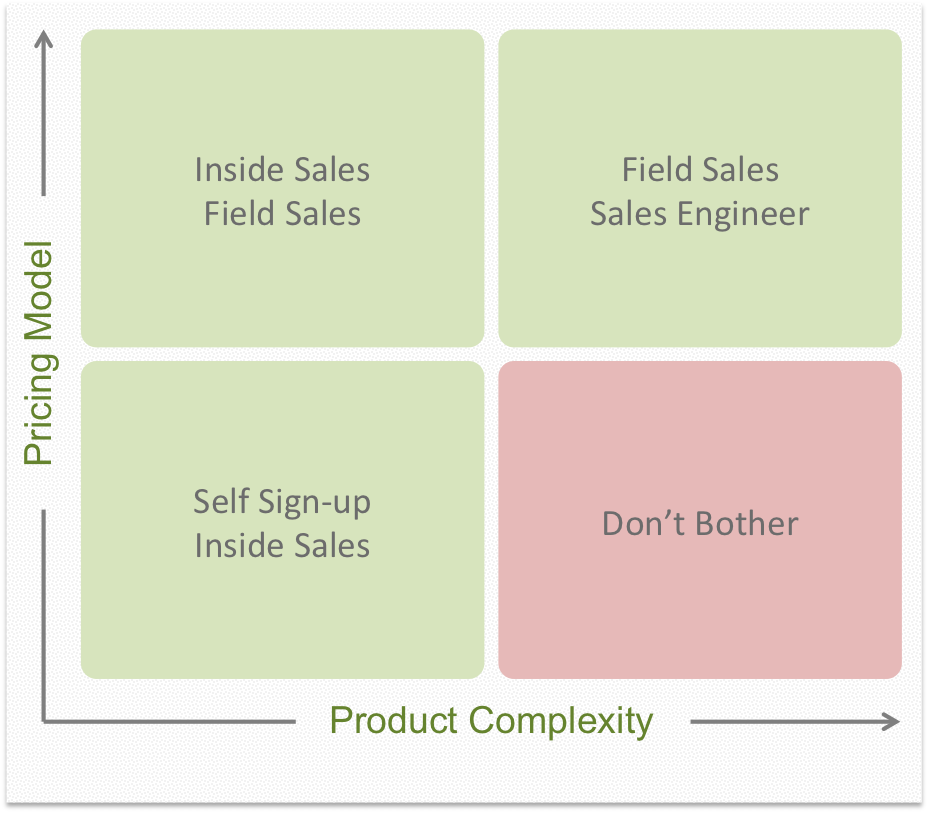You’ve gone through Customer Discovery and validation. You have a handful of early paying customers. Those early customers were probably sold by you (the founder) or your first sales person. You have validated your minimum viable product. It’s time to grow. What sales model is right for your company?
In my time at ATDC, scaling sales is probably the topic I spent the most time on with our ATDC Select companies. Figuring this out (along with your sales process and lead generation which I’ll cover in another blog) is one of the key criteria that determines whether a company is ready for graduation from ATDC. A scalable sales model is the key that drives your growth.
A startup’s sales model is primarily determined by two factors: pricing model and product complexity.
Your pricing model is how your products are priced – how much it costs, the basis for the cost, and how the customer is billed. For example, enterprise software might cost $x upfront, with an annual maintenance fee. A SaaS product might cost $y per month. How much you charge is determined by a range of factors including your costs, uniqueness, and the pain your product solves for the customer.
Product complexity includes the depth of features, ease of use, ongoing service, and difficulty of implementation. For example, enterprise software is often more complex than a mobile app.
The sales process must be tailored for each company, but sales models fall into the 3 broad categories:
Self Procured
Products that the customer is able to find, determine if it meets their needs, and purchase on their own are self procured. When you want to add a song to your iTunes library, you are able to search for the song, purchase it online, and download it from the iTunes store. When you purchase a product at the store you pick it up off the shelf and pay for it at the counter.
Inside Sales
Inside sales is when the sale is completed with the sales person and customer interacting remotely. Driven by technology, inside sales models are being used more frequently in B2B and some higher end B2C transactions. For example, when selecting a hosting provider for your web application you might contact several hosting providers to determine which one best meets your needs at the best price point and be given access to the servers remotely.
Field Sales
Field sales, or outside sales, are ‘face to face’ customer sales. For higher priced, more complex products, cases where there are numerous stakeholders involved in the purchasing decision, consultative sales, or products that need in person demonstrations – visits with the customer are necessary to seal the deal. Enterprise software that will be used by multiple departments is one example that might require field sales. Some complex field sales models also require sales engineers, which are product experts capable of performing detailed analysis to determine fit, configuration, and pricing.
Some companies employ multiple sales models. For example, Salesforce.com uses all of these. A small company with simple CRM needs can self signup for the cloud service online. An inside sales rep may also interact with the company remotely, qualify the customer, address their questions and concerns, and sign up the customer. Larger, more customized enterprise implementations are sold using field sales professionals and sales engineers.
So which sales model is right for your product? Lower priced products require less expensive sales processes – and more complex products require more customer interaction. Complex products sold at low prices are usually a recipe for unprofitability. The chart below illustrates how your pricing model and product complexity determine which model fits your company.
